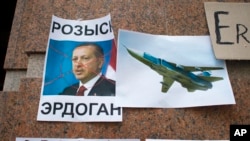Turkish-Russian relations look set to be one of the main beneficiaries of the July 15 failed coup attempt in Turkey. Even before the botched putsch, rapprochement efforts were slowly taking bilateral ties out of the deep freeze, after Turkey downed a Russian warplane operating from a Syrian base.
In the aftermath of the bloody coup attempt, Turkish President Recep Tayyip Erdogan was quick to confirm a planned meeting with his Russian counterpart, Vladimir Putin, now set for August 9 in St. Petersburg.
International relations expert Soli Ozel of Istanbul’s Kadir Has University argues with Putin's quick support of Erdogan during the botched military takeover, the dynamics of the meeting have markedly changed.
“There are unconfirmed reports Russia was the first one to warn the Turks about the possible coup. The fact that this will be the first major meeting by President Erdogan with any world leader makes it, of course, even more significant after the coup,” Ozel said.
Observers say Putin is likely to try exploit anger in Ankara over what it perceives as the late response of its Western allies in condemning the coup.
Political columnist Semih Idiz at Turkey’s Cumhuriyet newspaper says Erdogan’s visit to Russia comes at an opportune time for Putin.
“There is a lot of anti-Western [newspaper] articles and anti-Western statements from individuals and from government members. A lot of anti-Americanism. A lot of anti-NATO sentiment. So, foreign policy in that regard appears to be heading for some kind of crisis,” Idiz said.
Drive to normalize relations
Rebuilding Turkish-Russian relations is already well under way.
This week, Deputy Prime Minister Mehmet Simsek led a high level delegation to Moscow, to repair business ties between the countries damaged by Turkey’s downing of a Russian warplane on the Syrian border late last year.
But Ayse Sozen Usluer, head of International Relations for the Turkish presidency, says rapprochement efforts go beyond just economic relations.
“There is a mutual understanding these deteriorated relations do not benefit both countries. I can see a political will to normalize these relations. I guess the relations will be back how they were before the plane was shot down. Normal and based on mutual benefits, this kind of relations I am expecting,” Sozen Usluer said.
Deputy Prime Minister Simsek, during his visit to Moscow, resurrected the term “strategic partnership,” originally coined by Putin during his state visit to Ankara in December 2014.
But Russian Foreign Minister Sergei Lavrov last week suggested there will be a price for deepening relations, saying differences need to be resolved over Syria. Moscow and Ankara back opposing sides in the civil war.
But columnist Idiz warns Putin will be aware that, with Ankara facing strained relations with its Western allies with growing criticism over the severity of the crackdown on the alleged coup plotters, and Erdogan having a weak hand to play.
“Turkey is not in a strong position after this coup attempt. It will not be able to impose its will. It will probably has to be realistic in its approach, a realpolitik approach to regional issues,” Idiz said.
But observers say Erdogan’s meeting with Putin could be part of a wider strategy. The Turkish president is aware that sitting down with Putin could give him leverage with its Western allies. But Erdogan’s international relations chief insists Turkey remains committed to NATO and its relationship with Washington, but will follow a policy based on pragmatism.





